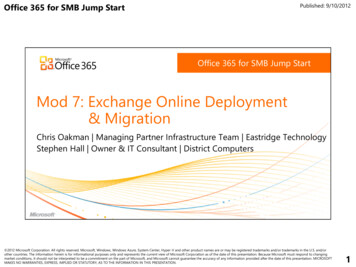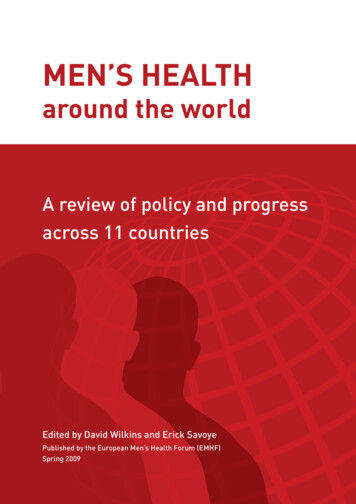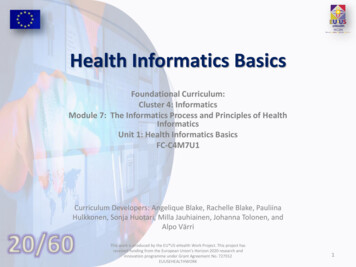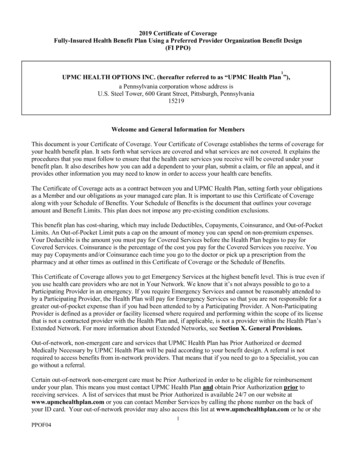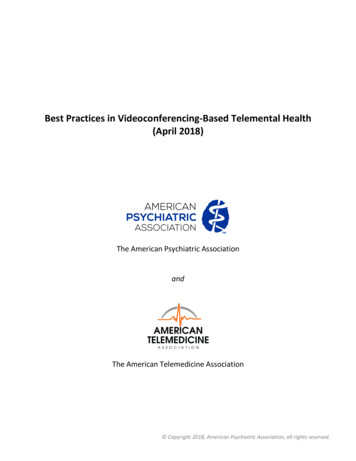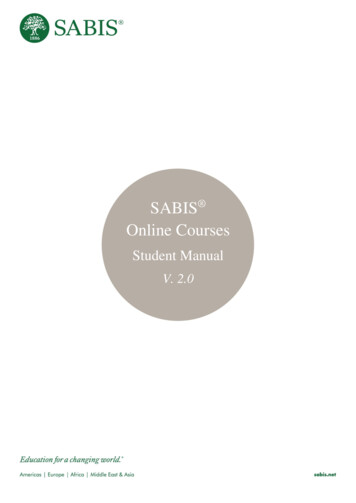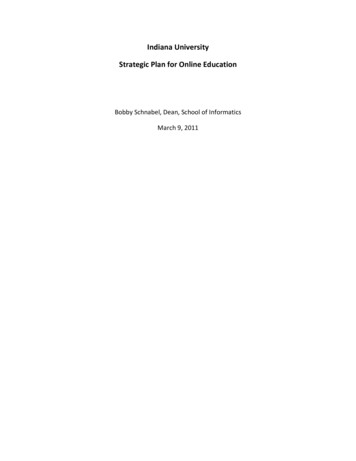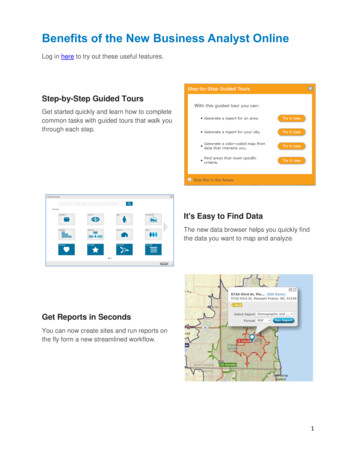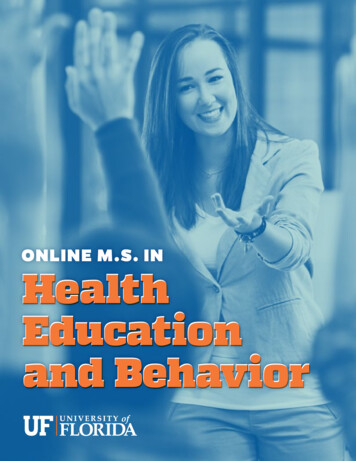
Transcription
ONLINE M.S. INHealthEducationand Behavior1
T H E 1 0 0 % O N L I N E M A S T E R O F S C I E N C E I N H E A LT H E D U C AT I O NA N D B E H AV I O R ( H E B )prepares current and aspiring healthsector professionals to successfully plan, implement, andevaluate health education and promotion in clinical, public,non-profit, and community health settings.T H E J O B M A R K E T F O R H E A LT H E D U C AT O R S A N DC O M M U N I T Y H E A LT H P R O M O T E R S I S E X P E C T E D T OG R O W 1 1 % F R O M 2 0 1 8 — 2 0 2 8 , M U C H FA S T E R T H A N T H E8 3 . 5 % C H E S E X A M PA S S R AT EN AT I O N A L AV E R A G E F O R A L L O C C U PAT I O N S .During the 2021 exam cycles, 61 students/graduates took theCHES exam. Of these test takers, 56 passed resulting in a—BUREAU OF LABOR STATISTICS (2018)83.5% pass rate—nearly 22.3% higher than the national average.The online M.S. in HEB curriculum was developed around the areas ofresponsibility as defined by the National Commission for Health EducationCredentialing (NCHEC), Inc., ensuring that students are equipped withthe competencies and skills necessary to succeed as health educationspecialists. By the end of the program, students will sit for the CertifiedHealth Education Specialist (CHES ) Exam.Our M.S. in HEB faculty are heavily involved in the field of health educationand promotion, and many of them are either Certified Health EducationSpecialists (CHES ) or Master Certified Health Education Specialists(MCHES ). Credentials aside, each of our faculty is invested in students’careers and professional aspirations and often provide personalizedguidance to help them meet their goals.21
Who Can BenefitThe online M.S. in Health Education and Behavior is geared to both current health educators andaspiring professionals who are passionate about health education and promotion. They typically aimto enhance their knowledge to advance in their careers and earn a higher salary in settingsthat include:Community health agenciesGovernmental health agenciesColleges and universitiesClinical health organizationsBusinesses/worksitesG R A D U AT E S O F T H E O N L I N E M . S . I N H E B W I L L B E A B L E T O : Identify, define, and describe principles and foundations of health education/promotion. Assess needs, assets, and capacity forCommunicate and advocate for health andhealth education and health promotion. Illustrate the highest standards of conducthealth education/promotion.and ethical behavior when makingPlan, implement, and conduct evaluationprofessional decisions in accordance toand research related to health education/the Unified Code of Ethics for the HealthpromotionEducation Profession (Coalition of NationalAdminister and manage health education/Health Education Organizations, 2020).promotion programs. Serve as a health education/promotionresource person.23
CurriculumThe 100% online Master of Science in Health and Human Behavior (HEB) was designed by healtheducation specialists in the College of Health and Human Performance to equip students with theskills and knowledge required to succeed in a range of clinical, community, and government healthsettings. The online HEB core curriculum was developed around the seven areas of responsibility asdefined by the National Commission for Health Education Credentialing (NCHEC), Inc. Students alsoREQUIRED COURSES (15 CREDIT HOURS)HSC 6037 P H I L O S O P H Y & P R I N C I P L E S O F H E A LT HE D U C AT I O N (3 credits)risk factors and health outcomes and how causalThis course covers history, philosophy, and ethics;relationships are interpreted for public health decisiontheories of health behavior and principles of learning;making. This course will also provide a comprehensiveareas of professional specialization; roles and functionsunderstanding of sources of population data in terms ofof professional health educators; certification andmorbidity, mortality, and other vital statistics. Scientificcontinuing education; trends.methods for approaching population data and identifyingpublic health problems and empirical analysis of data willchoose from a variety of program-specific electives — including four experiential options — that alignwith their career goals and interest areas.HSC 6318 P L A N N I N G H E A LT H E D U C AT I O NP R O G R A M S (3 credits)This course covers basic principles of healthIn addition to completing core coursework and electives, students are required to sit for the CertifiedHealth Education Specialist (CHES ) Exam before graduating. During the 2021 exam cycles, 61students/graduates took the CHES exam. Of these test takers, 56 passed resulting in a 83.5% passbe emphasized.education for various community health settingsHSC 6603 T H E O R I E S O F H E A LT H B E H AV I O R &P R A C T I C E (3 credits)and using communication media in joint planning forThis course covers selected health behavior theoriescomprehensive health education.and applying these theories to the practice of healthrate — nearly 22.3% higher than the national average.education and health promotion.HSC 6506 E P I D E M I O L O G Y (3 credits)Epidemiology is one of the basic disciplines of publichealth. One of the tasks of epidemiology is to unravel therisk factors of disease at the population level. The coursewill teach how to evaluate relationships between potentialHSC 6712 E VA L U AT I N G H E A LT H E D U C AT I O NP R O G R A M S (3 credits)This course covers models and strategies for conductingformative and summative evaluations of health educationprograms.PROGR AM ELECTIVES (15 CREDITS)T I ER I ( COM P L ET E A M I N I M U M OF 6 C R EDI TS F R OM T H E CO U R SE S L I ST ED B ELOW. )HSC 5956 W R I T I N G F O R P R O F E S S I O N A LP U B L I C AT I O N S (3 credits)This course covers procedures and practices in scholarlywriting for health-related professional publicationsincluding topic selection, literature searches, manuscriptpreparation, and legal and ethical considerations.HSC 6735 R E S E A R C H M E T H O D S I N H E A LT HE D U C AT I O N (3 credits)HSC 6665 H E A LT H C O M M U N I C AT I O N S (3 credits)The goal of this course is to help students understand howthe health industry operates and what role the student,as a health practitioner and health consumer, plays inthat operation. The philosophy behind the course is that,to understand any component of the industry, studentsmust understand how the components work and whatfactors have shaped and continue to shape the industry.This course is an introduction to research methods usedin health education and behavior.45
T I ER I I ( COM P L ET E A M I N I M U M OF 9 C R EDI TS F R OM T H E CO U R SE S L I ST ED B ELOW. )HSC 5135 E M O T I O N A L H E A LT H E D U C AT I O N(3 credits)This course is designed to acquaint students with theoriesof emotion, behavior change, and health counseling aswell as their application. The course explores factorsassociated with the development and maintenance ofemotional health and the means of incorporating positivemental health practices into health education/promotionprogramming and health counseling. In addition, thecourse focuses on the development of a core set of healthcounseling skills. The course builds a base of healthcontent, theory, and skills that are useful for studentsinterested in health careers, and, most importantly, forthe individual student’s own health.HSC 6235 PAT I E N T H E A LT H E D U C AT I O N (3 credits)This course provides an introduction to theories thatapply to the practice of patient education in a variety ofhealth care settings. Emphasis is placed on educationfor health promotion and lifestyle changes. Additionally,this course aims to provide a critical overview of theU.S. health care industry. This course focuses on therole of the health educator in teaching patients toHSC 6595 H I V/A I D S E D U C AT I O N (3 credits)This seminar course examines the medical, social, legal,and educational impacts of HIV/AIDS on individuals andsociety.foundations of the health education process, the uniqueneeds and characteristics of learners in the patient role,a survey of instructional strategies appropriate for healtheducators (i.e., teachers) and patients (i.e., learners),patient health literacy and its implications for healthHSC 5138 H U M A N S E X U A L I T Y E D U C AT I O N(3 credits)education programming, and health education evaluationThe course is designed to increase students’ knowledgemethodology.of human sexuality issues, to increase students’HSC 6629 H E A LT H P R O M O T I O N P R O G R A M SF O R P R I O R I T Y P O P U L AT I O N S (3 credits)The course addresses health issues confrontingsocioeconomically disadvantaged in America. The courseis not intended to be a comprehensive treatment ofall pertinent health problems affecting minorities, butaddresses some of the more salient health concerns.HSC 6646 C O M M U N I T Y I N J U R Y P R E V E N T I O NAND CONTROLan opportunity for students to explore and clarifyThe multi-dimensional roles of American women asThe focus of the course is on unintentional injury;their personal sexual attitudes and beliefs. Courseindividuals, partners, mothers, nurturers, caretakers,however, intentional injury is briefly introduced.requirements, including class activities, emphasizeand career persons cause our health status to be of vitalIntentionality is an important component in injurythe importance of both content and process in humanimportance. While women and men both experienceprevention and control and therefore cannot be excludedsexuality education.similar diseases, disorders, and causes of death, womencompletely. Unintentional injury is defined as an injuryoften experience these in different forms and at differentthat is judged to have occurred without anyone intendingstages and ages in life. The primary purpose of this courseharm be done; in many settings these are termedis to explore current issues in women’s health. The course“accidental injuries” (National Association of Injurycovers a broad range of health issues that are eitherControl Research Centers). The goal of this course is tounique to women or of special importance to women.increase students’ knowledge and understanding ofOther topics include information for the health consumer,unintentional injuries as a public health problem.a variety of perspectives. We will consider biological,psychological, social, environmental, and policy-relatedcauses. We will also consider interventions to preventand treat obesity with an emphasis on the assumptionsworksite including health risk appraisal, program design,and special educational strategies appropriate for theoccupational setting.HSC 6850 I N T E R N S H I P I N H E A LT H E D U C AT I O N(1-3; max 3 credits)HSC 6905 I N D E P E N D E N T S T U D Y I N H E A LT HE D U C AT I O N (1-3; max 3 credits)SC 6910 S U P E R V I S E D R E S E A R C H (1-3; max 3 credits)HSC 6575 W O M E N ’ S H E A LT H I S S U E S (3 credits)This course will examine the causes of obesity fromimplementing, and evaluating comprehensive healthethnic/racial minority groups politically as well aslevel of comfort with sexuality topics, and to provideHSC 5925 D E T E R M I N A N T S O F O B E S I T Y(3 credits)This course explores considerations in planning,education and health promotion programs at themaintain optimal health and become independent inself-care activities. Course content addresses the basicHSC 6695 W O R K S I T E H E A LT H P R O M O T I O N(3 credits)HSC 6940 S U P E R V I S E D T E A C H I N G (1-3; max 3credits)preparation as an advocate of healthy lifestyles, andawareness of the role health plays in the life of all women.of the intervention on causes and maintaining factors forobesity.67
89
AdmissionsADMISSIONS REQUIREMENTSIdeal candidates for the online Master of Science inA P P L I C AT I O N M AT E R I A L S S TAT E M E N T O F P U R P O S E — For full instructionsHealth Education and Behavior will have:on your statement of purpose, please visit our Admissions page.Graduated from an accredited college oruniversity with a minimum 3.0 grade-pointaverage (GPA) for all undergraduate coursework highlight previous professional and academicbeyond 60 credit hours Gained experience in the industry Strong interest in the Health Education andexperience, as well as achievements, awards, andongoing international affiliations and researchfunding. Please ensure this information isBehavior industry TUITIONFINANCIAL AID OPTIONSincluded on your curriculum vitae (CV) or resume.Clear short- and long-term career goalsNote: The Department of Health Education andR E S U M E — Your resume should be current and T H R E E L E T T E R S O F R E C O M M E N D AT I O N — At leasttwo letters must be from full faculty membersBehavior is not requiring or reviewing GRE scores asCost/Credit Hour (includes fees): 585.75The University of Florida offers financial aid forTotal Tuition (30 credit hours): 17,572.50graduate students, including employment andloan programs. Graduate students should begin bywho can attest to your academic ability. Anpart of admission for all terms through 2023. Decisionsexception exists for this requirement if you haveabout GRE requirements after Fall 2023 will be updatedbeen working in the profession for at least fiveonline.years. In this instance, at least one letter mustbe from a faculty member and remaining lettersThe standards described below apply to all students—domestic and international. Additional requirementsTuition excludes the cost of textbooks and materials,applying for aid, using FAFSA: fafsa.ed.gov. Thewhich vary by course. Students are provided withFAFSA school code is 001535.a list of required textbooks and materials uponregistration.Degree-seeking students can apply for student loansand learn more about their grant, scholarship andcan be from other professionals who can speak toloan options through our Student Financial Affairsyour ability to excel in graduate school.site: www.sfa.ufl.edu/graduate-students.apply to international applicants. Learn more on ourAdmissions page: hebmastersonline.hhp.ufl.edu/ O F F I C I A L A C A D E M I C T R A N S C R I P T S — Officialtranscript should be sent directly from theadmissions.institution to graduate@admissions.ufl.edu or:Mail to:UF AdmissionsPO Box 114000201 Criser HallGainesville, FL 32611-4000 10A P P L I C AT I O N F E E : 3 711
ABOUT THEUN IVERSIT Y OF FLORI DAThe mission of the University of Florida is to enable its students to lead andinfluence the next generation for economic, cultural, and societal benefit.Since our founding more than 160 years ago, we have continually pushed theboundaries of knowledge forward. The university is committed to servingthe state of Florida, the nation, and the world by pursuing, creating, anddisseminating new knowledge while building upon the experiences of the past.In 2022, UF was listed as the #5 Top Public University by U.S. News & WorldReport, marking the fifth consecutive year listed in the top 10.As a student at UF, you become part of the Gator Nation, a loyal, committed andsupportive network of more than 415,000 alumni throughout the United Statesand in more than 150 countries around the world.Contact an enrollment advisor today to take the first step toward completingyour graduate degree.1213
Phone: (888) 533-6944Email: HEBonline@hhp.ufl.eduWeb: hebmastersonline.hhp.ufl.edu14
choose from a variety of program-specific electives — including four experiential options — that align with their career goals and interest areas. In addition to completing core coursework and electives, students are required to sit for the Certified Health Education Specialist (CHES ) Exam before graduating. During the 2020 exam cycles, 51


